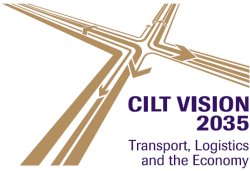The Future of UK Freight
 The Chartered Institute of Logistics and Transport (CILT) launches Vision 2035, Transport, Logistics and the Economy - a significant series of new reports on the future of the UK’s transport infrastructure. Its first report, UK Freight Planning to 2035, examines the challenges facing the future growth of logistics capability of the UK.
The Chartered Institute of Logistics and Transport (CILT) launches Vision 2035, Transport, Logistics and the Economy - a significant series of new reports on the future of the UK’s transport infrastructure. Its first report, UK Freight Planning to 2035, examines the challenges facing the future growth of logistics capability of the UK.
CILT’s well-received Vision 2035 report of 2011 captured headlines with its predictions for the UK’s infrastructure 25 years hence. Now the Institute is following it with a series of in-depth reports addressing how the UK is shaping up to meeting the challenges. The first of these discusses the future of freight.
The report has been drawn up by a team of senior transport and supply chain professionals, headed by Professor Alan Braithwaite FCILT, and makes the case that the importance of the UK’s freight infrastructure is of such magnitude that it requires strategic national direction. This applies particularly in the case of multimodal rail interchanges, which are currently considered a political ‘hot potato’ because of local opposition.
The report has four key observations to make:
-
Planning for urban hubs should be made a priority under the national guidelines, and local authorities given powers to purchase land and determine its use for such schemes. This would provide necessary consolidation and relieve congestion in our cities and major towns.
-
All major distribution parks should be planned with a presumption of rail connection and suitable sites identified nationally and facilitated by local authorities. This measure will bring down the high cost of development and make a more effective market where national need is balanced clearly with local interests.
-

Planning for infrastructure considered to be of UK national importance should take precedence over local agendas. The devolved governments should be engaged in the UK planning process to ensure that regional and national policy developments are aligned.
Former CEO of CILT says: ‘The UK is already congested and we cannot rely on market-driven solutions alone, we need direct policy input to facilitate engagement. This is about giving industry the confidence to invest to serve supply chains and meet the needs of local communities and national interests.’
The report concludes that adopting these measures will form an integrated policy that will in turn drive investment and growth and ensure the UK’s economy has the infrastructure it needs moving towards 2035 and beyond.
View the CILT Freight 2035 report here.